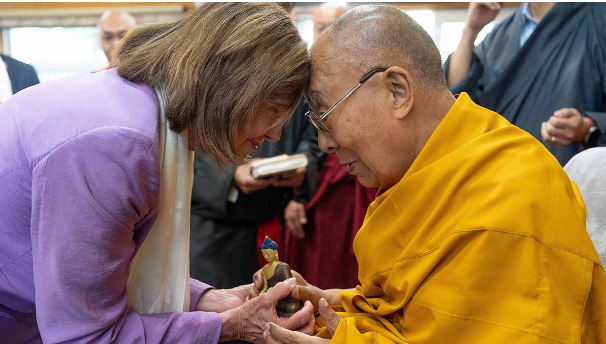Nancy Pelosi has constantly criticized China’s repressive practices.
NANCY PELOSI, a name synonymous with resilience and unwavering commitment to human rights, has long been a formidable figure in American politics. Her relationship with His Holiness the Dalai Lama and the Tibetan people is a testament to her dedication to justice and freedom. As someone who has consistently stood up to China, Pelosi has an admirable legacy of courage and tenacity.
Pelosi’s history of challenging China dates back to 1991, when she unfurled a pro-democracy banner in Tiananmen Square, commemorating the victims of the 1989 massacre. This act of defiance was a clear message to Beijing that the US would not turn a blind eye to human rights abuses. Over the years, Pelosi has consistently criticised China’s record on human rights, from the treatment of Uyghur Muslims in Xinjiang to the suppression of freedoms in Hong Kong and Tibet.
Pelosi’s connection with the Dalai Lama and the Tibetan cause dates back to the early years of her political career. In 1989, she was one of the first American politicians to meet with the Dalai Lama after he was awarded the Nobel Peace Prize. This meeting marked the beginning of a long-standing friendship and a shared commitment to the Tibetan struggle for autonomy and human rights. One of the most poignant moments in Pelosi’s advocacy for Tibet came in 2008, during the Beijing Olympics. Despite the potential diplomatic fallout, she led a congressional delegation to Dharamsala, the seat of the Tibetan government-in-exile. There, she met with the Dalai Lama and expressed her solidarity with the Tibetan people. Her visit was a bold statement against China’s human rights abuses and a clear message that the world was watching.
She has consistently used her platform to call out China’s oppressive policies and to advocate the rights of the Tibetan people. In 2007, she played a crucial role in the passage of the Tibetan Policy Act, which aimed to support the preservation of Tibet’s unique religious, cultural and linguistic heritage. During a visit to Tibet in 2015, she and her delegation were closely monitored by Chinese authorities. Despite the restrictions, Pelosi managed to meet with local Tibetans and hear their stories of resilience.
Pelosi’s role in world affairs extends beyond her advocacy for Tibet. As the first woman to serve as Speaker of the US House of Representatives, she has been a trailblazer for women in politics. Her leadership during critical moments, such as the passage of the Affordable Care Act and the impeachment proceedings against President Donald Trump, has cemented her reputation as a formidable and principled leader.
Her stance on China has been particularly noteworthy. Pelosi has been a vocal critic of China’s human rights record, its aggressive territorial claims and its influence on global affairs. She has consistently called for a tougher stance on China, advocating policies that promote human rights and democratic values.
Pelosi’s visit to Taiwan in August 2022 was a significant moment in her career and in US-China relations. Despite warnings from Beijing and even caution from the Biden administration, Pelosi proceeded with her trip, emphasising the US’s unwavering support for Taiwan’s democracy. Her visit was met with strong condemnation from China, which conducted large-scale military exercises in response. This move was seen by many as a bold statement against China’s increasing assertiveness in the region.
Pelosi’s achievements in a male-dominated field are even more remarkable as she has consistently stood up to powerful adversaries. She has shattered glass ceilings and paved the way for future generations of women leaders. Her ability to navigate the complexities of international politics while maintaining her commitment to human rights and justice has made her a significant figure in world affairs.
The author is the son of Gyalo Thondup, the Dalai Lama’s elder brother and his former personal representative to China. He lives in Taiwan.













